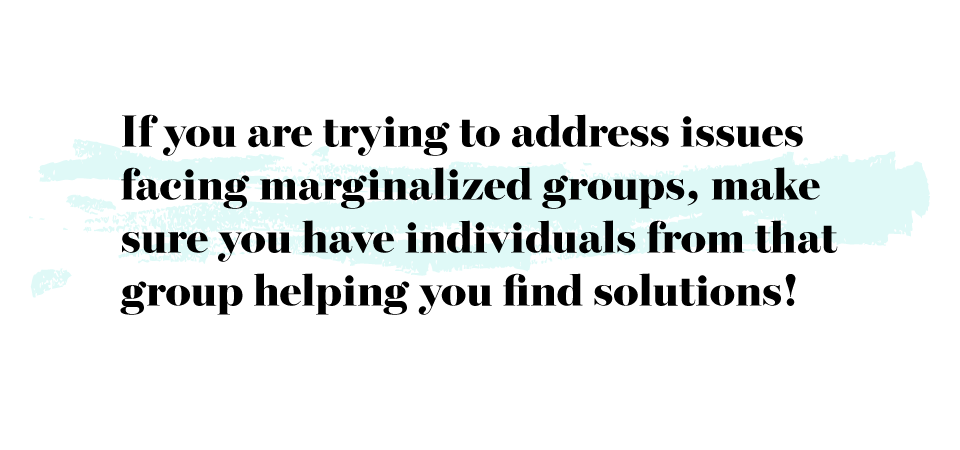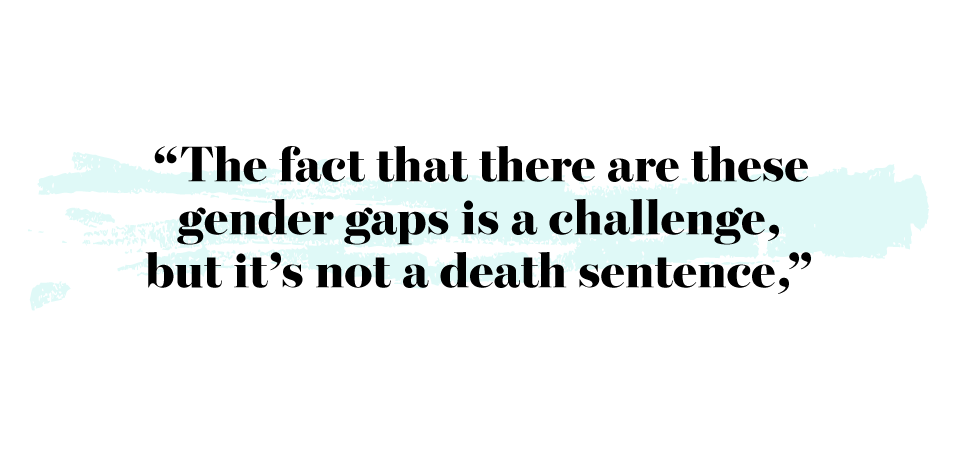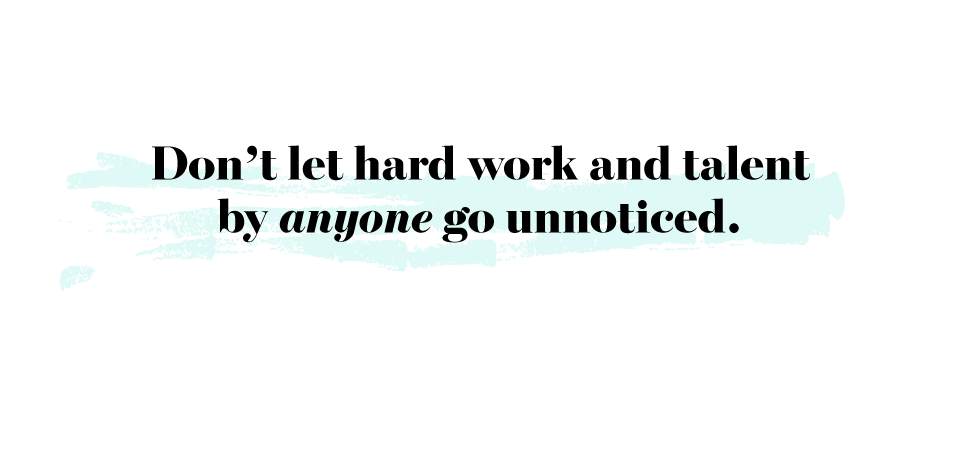If you follow Career Contessa, you know that our whole deal is getting women into diverse, impactful, and fulfilling careers.
We recognize there are barriers though. Challenges that are complex, pervasive, and ever-changing. No place are these challenges clearer than in STEM.
We've spoken about the "
pink aisle" and how it affects the way girls are exposed to the sciences, but things don't get easier once you reach adulthood.
This industry has produced dozens of incidents regarding verbal and sexual harassment, assault, blatant denial of studies due to the gender of the individual submitting (a study was once returned without peer-review until the submitees found "one or two male biologists to co-author and strengthen their paper") along with hundreds of incidents whispered instead of reported—all because of antiquated power structures.
Quite frankly, we want to talk about all of these (and probably will) but today we're starting small, with bias. Bias—both on the surface and subconscious—is something that seeps into every industry and affects everyone.
We know there is a dizzying amount of biases that affect women in STEM, but again—we're taking baby steps.
Here, we've rounded up three all-too-common biases that are keeping women from joining (and staying) in
STEM careers—along with how you can try to navigate these muddy waters.
1. Women Are "Too Sensitive"
Time and time again this stereotype is proven wrong. However, these feelings—like a lot of other biases out there—might be due in part to a lack of exposure. The fact is there are very few women in this industry, especially in leadership roles.
This means that people are working off assumptions about how women are at work. (Thanks to media, this might look like me tearing up over a cell culture while Damien Rice plays in the background. The pinnacle of sensitivity.)
Additionally, it has been shown that while women are just as resilient with feedback as men. When consistent negative feedback is coupled with a sense of "misfit" or lack of belonging, women might be more likely to opt out for a better fit.
Interestingly, this same
VOX study found that addressing the gender gap head-on wasn't doing anyone any favors. In fact, blatantly addressing a lack of women in STEM during college was shown to increase the sense of "otherness."
This is something we see a lot. Large companies (in this case, schools) see a gap and want to address it, but don't make any real, measurable change because of a
lack of inclusion in the decision-making process.
So we're going to say this for the people in the back: If you are trying to address issues facing marginalized groups, make sure you have individuals from that group helping you find solutions!
Solutions:
- Find an affinity group (or create one): Find your tribe and hold on. If you haven't been able to find a group, create one. When creating an affinity group, make sure you have a mix of individuals. Think about multiple levels of experience, differing fields within STEM, and if possible, include folks from different cities.
- Find a mentor: Whisper networks can help you find a mentor in your field who can both help you advance your career and create a safe space for you.
- Showcase those talents of yours!: Get out there and promote yourself. We know this can feel uncomfortable at first, but we also know that you have the power to be your own champion!
2. Women Aren't as Savvy at Spatial Awareness
It has been said that there are gender-based differences in spatial awareness skills. This is what people cite when the lack of women in STEM, particularly engineering, is brought up.
While there have been a couple of
studies that cite anatomical differences between men and women affecting spatial skills (specifically the amount of grey matter in the parietal lobe of the brain) they have yet to be corroborated. In fact,
a 2015 study states quite the opposite: “human brains do not belong to one of two distinct categories: male brain/female brain.” Because these studies are inconclusive—and often contradictory—we look at the environment.
The underperformance of women in
spatial tests isn't something that is specific to Western cultures. Truly, from young ages, the way the world expects girls to play versus boys might be where the problem starts. (For more on this, check out
Debbie Sterling's episode of
The Femails.) A lack of exposure to spatial problem-solving might be putting women at a disadvantage. And this problem is exasperated when (male) colleagues actually
expect you to underperform, increasing the sense of "outsider".
While the gender gap in this skill is real, it can be
fixed. And something that can't be argued is that women have the ability to learn at astounding rates. Just like any other hard skill, spatial skills are something that can be learned. “The fact that there are these gender gaps is a challenge, but it’s not a death sentence, I know it's something we can
fix.”
There are now dozens of courses that focus specifically on how different learning styles can tackle spatial understanding. These courses have proven to positively affect test scores.
Solutions:
- Take a course: Courses using motion, like block manipulation and sketching have been proven effective in building spatial skills.
- Utilize a group lunch: Holy moly, we loved googling "activities to boost spatial skills." Next time you have a brainstorming lunch with your team, consider bringing a tangram, or jigsaw puzzle. Not only is this a fun team-building activity that doesn't resort to competition, but it also flexes those spatial awareness muscles. If games aren't your team's thing (bummer) think about incorporating sketches into meetings. This can be as easy as drawing flow charts or diagrams to represent ideas.
- Send the ladder back down (and start early): Do you have a child or a friend with a child? Next birthday, think about introducing spatial manipulation into gifts. Think Legos, GoldieBlox, sketch pads with models, etc.
Women Aren't "Tough Enough" for Fieldwork
This dinosaur of an idea somehow persists.
Just like other industries that require travel, women are often not even approached for these opportunities because leadership might assume we need to stay close to family obligations, or grossly misunderstand how menstruation could possibly happen while in the field. (It was hard to type that sentence while facepalming.)
The problems aren't over once women are asked to go on field assignments. Despite the fact that there are hundreds of highly impactful fieldwork studies submitted by women every year, when they're not visible, people resort to these gross biases.
When more people and funding are behind male studies (this is in large part due to the lack of women in the field,) studies conducted by women can be buried or only released to women-specific sites which can lead to shouting in an echo chamber.
Even when women aren't the head of fieldwork studies, problems persist, specifically for trainees or students.
Reports of inappropriate sexual comments, physical harassment, and assault are very real. Not only are these dangerous problems something women face more than men, but the reporting of these instances aren't clear cut.
"Fewer than half of the respondents (who have reported sexual misconduct) recalled a code of conduct or posted set of rules for behavior at a field site where they worked. Of those who did report being harassed or assaulted to their institution (including 36 women and one man), only about 19% said they were satisfied by the outcome of their reporting," reports
Science Magazine
Solutions:
- Advocate for yourself: If fieldwork is something you are interested in, say something. Set up a meeting with your direct supervisor, express interest, share how it can help the department as a whole, and ask what steps would need to be in place to make it happen.
- Learn the procedures for reporting: When going out into the field, make sure you—and your colleagues—are comfortable with the chain of command and procedures for reporting any misdoings.
- Seek out (and share) fieldwork done by women: Don't let hard work and talent by anyone go unnoticed. Twitter is a great place to seek out and share some remarkable finds from diverse contributors.














